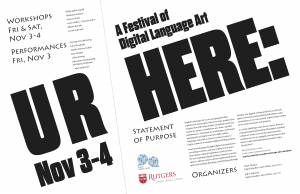November 3-4, 2017
Rutgers University—Camden
Writers House
305 Cooper Street
Camden, NJ 08102
This event is free and open to the public.
Schedule
FRIDAY
Coffee + Welcome
Claire Donato and Jeff T. Johnson
9:30-10:00am
New Defaults
Laurel Schwulst
10-1:30pm (including 11:30-12 coffee/snack break)
Where does “Lorem ipsum,” the ubiquitous, nonsensical filler text come from? If placeholder content shows one’s soul, why not use something with a little more je ne sais quoi? In this workshop, we’ll learn how to generate and tweak unique filler text. Like “Lorem ipsum,” text could be “random” but in a new way, or it could stream in from a source, like the latest weather or news. We’ll learn about APIs, or “application program interface,” and how to manipulate data flowing from it. Finally, we’ll consider how to use and present our new defaults to an audience. No prior technical knowledge is required to participate.
Lunch
Keynote – Victoria Sobel & Casey Gollan
1:30pm-2:30pm
Beyond Clicktivism
Grayson Earle
3:00-4:30pm
The blockchain promises a radical future with automated and frictionless flow of capital, but how radical can a new financial system be if the same cast of characters benefit? This workshop takes a critical approach to the blockchain and its emergent capabilities and seeks to provide some insight into radicalizing this new virtual ecosystem.
Evening performances
5:00pm (wine and cheese will be served)
Asha Sheshadri
Muslin (Steven Vallot)
Kate Durbin video
Claire Kwong
[This Space Intentionally Left Blank] Collective
Open Projector
SATURDAY
Podcasts Don’t Have to Be Stupid and Neither Do We
Willis Arnold
10:00-11:30am
In this workshop, participants will examine the inherent democratic characteristics of audio storytelling and be exposed to various digital/sound techniques. Participants will also discuss methods of resisting podcasting’s almost immediate incorporation into AN entrepreneurial capitalist paradigm. Skills include audio editing concepts, production techniques, and developing critical listening.
Break and box lunch
11:30am-12:30pm
Creative Writing with Rules and Computation: No Programming Required
Allison Parrish
12:30pm-2:00pm
Mainstream attention on computer-generated text focuses on its supposed ability to supplant the professional writer. In this workshop, we’ll learn the truth: computer-generated text can be useful, but it’s far more interesting as a creative and poetic tool, to create and thereby investigate absurd juxtapositions, poised on the brink of the infinite void of nonsense. We’ll learn how to use Tracery (created by Kate Compton), a freely available tool that makes it easy to create expressive text generators—with no prior knowledge of computer programming. (If you do know how to program, good news: there are open source libraries for incorporating Tracery grammars into your own programs.)
Machine Poetics
Abraham Avnisan
2:30pm-4:00pm
What is an algorithm? How can deterministic machines be used to create original, language-based artworks? In this hands-on workshop we will explore these questions by collaborating both with machines and with each other in order to write our very own algorithmic poetry generator. Participants will be introduced to coding with JavaScript using the open-source creative coding platform p5.js. No prior technical knowledge is required to participate.
Statement of Purpose
Digital language art is an emerging field that explores the interactions between texts produced in conjunction with other media, including visual art, sound art, games, installation art, video, and live performance. Via hands-on workshops, conference participants will gain concrete skills, gather language materials, resources and concepts to begin, advance or energize digital writing projects.
Festival workshops imagine digital environments as writing contexts, and use writing to ask questions about cultural institutions and systems. We are exploring digital writing contexts as active spaces. And we come to better understand those spaces by writing, thinking, and thinking through writing. Any digital writing project is an investigation of material and cultural affordances and constraints, so we can actively explore those stakes as we write and make our projects.
A central challenge: How do we swerve from an entrepreneurial and techno-libertarian mindset (which we notice even at arts spaces/events/conferences) to an engaged, activist stance that doesn’t take institutional and market logics for granted?

